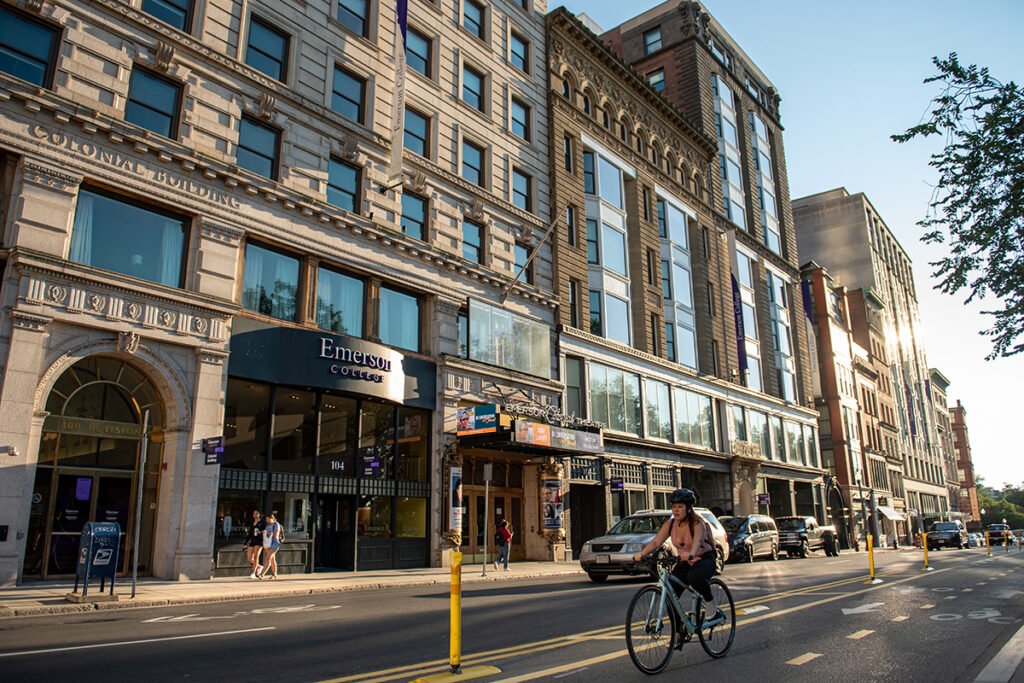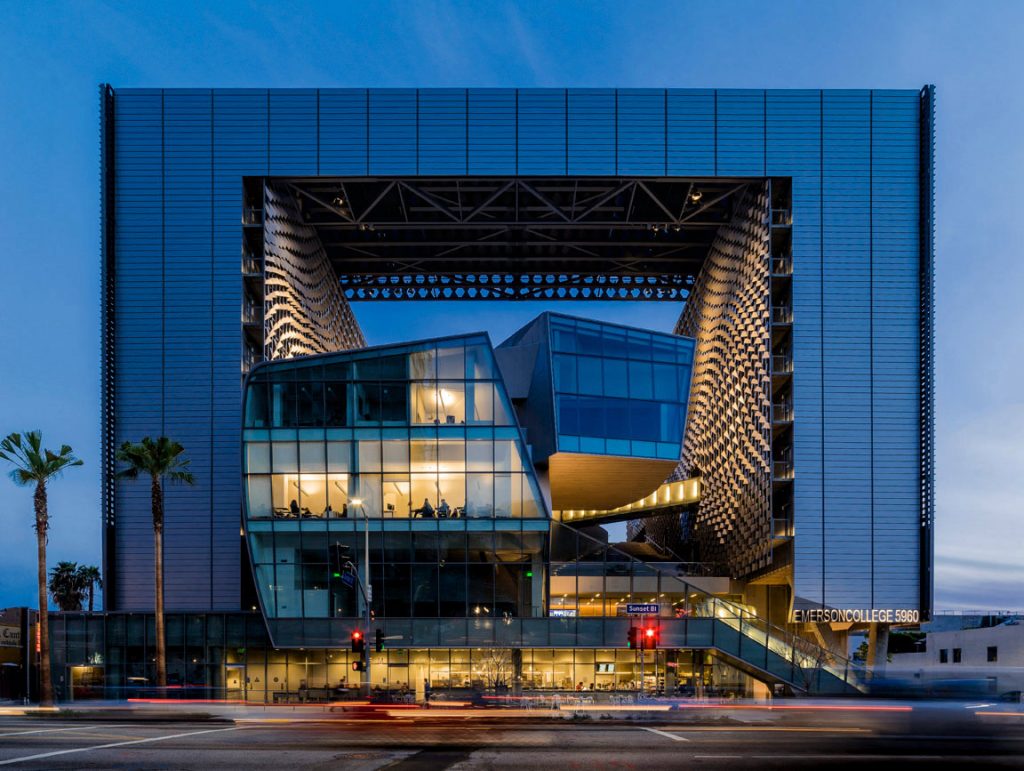Emerson 360: What It is, How It’s Used, Why You Should Take It

On November 1, every current student, faculty, and staff member got an email from ModernThink, along with a personal code and an invitation to fill out a 10- to 20-minute-long Emerson 360 survey sharing “their perspectives of the Emerson experience.”
It’s a little extra work during a busy time of year, but it’s worth your while to fill it out, according to campus leadership.
“As a new president in the midst of strategic planning, I need to hear from our students, faculty, and staff about what is working well at Emerson, and where we need to grow or make changes,” President Jay Bernhardt said.
“The more community members who complete this survey, the clearer the picture. This is your opportunity to tell College leadership exactly how you feel about living, learning, and working at Emerson.”
This will be the third Emerson 360 survey Emerson sends to community members. The first two yielded some of the services and supports that we have today.
While the Healing & Advocacy Collective was formed prior to the first survey in 2014, the results allowed them to channel their support, training, education, and bystander intervention efforts, Healing & Advocacy Director Melanie Matson said. The data also was used to inform policies and processes of the Office of Title IX, Equity and Access (now the Office of Equal Opportunity).
The second survey, given to faculty/staff in 2017 and students in 2018, in conjunction with community action led by Access, SEIU, POWER, and others on campus, led to the Circle of Creative Scholars and additional staff/resources for student support, Matson said.
The Employee Appreciation & Recognition program, which comes with monetary and non-monetary gestures of thanks and appreciation for campus work, arose from the results of the first survey, Social Justice Collaborative Executive Director Alayne Fiore said.
Emerson Today talked to Shaya Gregory Poku, Vice President for Equity and Social Justice, about the intention behind the survey, how it might be used, and why it’s critical that as many Emersonians as possible give their honest feedback before the Nov. 22 deadline. Interview has been edited for length and clarity.

ET: Let’s just start with the basics. When we say campus climate, what do we mean?
Shaya Gregory Poku: When we think about community climate, we think about the pervading feelings and emotions associated with a particular living, learning, and working environment. And really especially staff, student, faculty perceptions of the work, academic, and living environment. Then, how those additions are associated with equity, access to social justice, within the environment.
To give the definition, but also editorialize, I think the climate question is really important, because people experience the institution differently depending on how they identify, depending on which department they’re in, depending on which buildings they live and work in, etc, so the climate is really about understanding people’s perceptions and experiences of the institutional environment and structure we create.
ET: I know we’ve done these before, but lot of community members, and students in particular, are new. Why is the college asking us about this now, and what are you trying to learn?
SGP: I think, one, it’s important because we have a new president, and, of course, the College is going to do a formal strategic planning process. A lot of these pieces really do help us unearth and understand what are those big picture patterns that are shaping where we can do better, where we can do more, or where we’re already really doing excellent work, where we can invest more in things that are really making a difference for people in the community. I’ll also say, for me, it’s important that on a cyclical and recurring basis we understand this.
This is also post- — not post, endemic – COVID, so it really also gives us a moment, post the crisis management processes associated with COVID, to really check in. How is our community feeling? Where is our community strong? Where does our community need to be strengthened? I think the timing, both in terms of where we are with COVID being endemic as opposed to being a pandemic, in terms of having a new president, and then also, I’m still earlier in my tenure as vice president, so this is going to be really instrumental for me.
We’ve done a number of surveys for students…. They give us insight into the student experience and perceptions, but we haven’t surveyed staff and faculty in quite some time. I think those perceptions and those experiences are going to be really important too
ET: Could you talk a little bit about why students and faculty and staff are getting different surveys?
SGP: Absolutely. The student survey has the general climate and perception pieces that [are] mostly parallel to the staff and faculty; there are some specific questions about their major and the resources that exist for them uniquely as students. But there also is a longer extended portion, because we have requirements both at the state level and the federal level to get information about students’ experiences with interpersonal violence and sexual violence, etc., that the survey also fulfills requirements around, too.
For example, colleges and universities are required to do what they call a “sexual misconduct survey” about what resources exist about students’ knowledge and awareness of those resources, etc. But because at Emerson we consider those part and parcel of the larger climate and experience of the institution, we combined them into one survey. Those are the kind of reasons why the surveys are different between staff and faculty and students. But the staff and faculty surveys are identical.
ET: Will you be able to tell who the respondents are from their answers?
SGP: Absolutely not. And part of the reason why we actually go through ModernThink as a separate vendor is because they give us back anonymized data, so none of your identifying information is remotely associated with any of the data we get received back. It’s never even on our servers.
Additionally, anything that’s too small … gets aggregated up into the next larger bucket. So let’s say Communications, for example, is a smaller department, so they might aggregate that up to Marketing and Communications, or a larger umbrella, to protect people’s anonymity even more. That’s something we take very seriously. People should feel pretty confident that nothing they say — unless they literally write in an open-ended question —
ET: “My boss, so-and-so.”
SGP: Yeah. So unless people write something very, very telling in the open-ended questions, there’s no way for us to know.

ET: I know there won’t be any identifying information, but that aggregated information, will everyone have access to that once ModernThink collects it?
SGP: The goal is definitely to do some intentional sharing back with areas. I do also want to be clear that there will be data segregation. So, for example, we want to know [data specific to] School of Arts, School of Comm., Marlboro Institute. We do want to know Finance and Administration versus Office of the Arts. There are some pieces where we do want to have some specificity, where we want to understand how different members of the community are experiencing the environment: students with disabilities, LGBTQ+ students and staff, academics, that kind of thing. I’m actually working on a plan about what that sequence would look like.
ET: Will there be any opportunities for the community to talk about the results?
SGP: Absolutely. And we’re still figuring out exactly what the best modalities will be for that to happen, but absolutely. It is incredibly important to me and to every member of the Social Justice Collaborative. I think there’s no point in collecting this information unless we share it back so that we understand ourselves. This isn’t just for me to understand Emerson, or for Dr. Bernhardt to understand Emerson, this is for us to understand who we are as a community and where we want to go.
ET: Could you talk a little bit about why it’s so important that we get a lot of participation and what happens if we don’t. How compromised will the data be if we don’t get a good turnout?
SGP: It’s incredibly important because otherwise it’s really not reflective of who we are, it’s reflective of one division or parts of a division. The reason why I say this is because everyone’s input matters so much, and everyone’s experience here is unique, so if I’m missing out on your unique perspective of Emerson, I’m missing a piece of the puzzle of who we are as a community. No one else has your unique experience.
And your unique experience also helps me to see patterns and trends of people like you, whether that’s because you’re a caregiver of elders, or because you are someone who came to Emerson because you are really interested in creative pursuits as a staff or faculty member – particularly staff – and you’re looking for more opportunities to be still plugged into creativity here. Whatever your story is, if we don’t have those numbers in a broad proportion of our community that’s represented in the sample, then it’s not just the quantitative pieces that are missing, it’s also the actual authenticity of the story that we understand about who we are.
ET: Is there anything else you think people need to know?
SGP: Yeah, people are eligible for up to $1,000. And part of the reason why we have such strong incentives is because it is a homegrown survey tool, and it is something that’s about us. Every survey that happens here at Emerson is about us, but this is at a different kind of scale. And there’s three opportunities to be eligible for a $1,000 taxable gift card, and students automatically would get $5 EC Cash.
I think people often have ideas, people often have suggestions, people often have concerns, and they’re not always sure where they should place them. This is really a catchall for anything that you’re thinking about what you really like about Emerson or what you really want to improve about Emerson, to really make sure that senior leadership and the entire community knows your truth.
ET: You want to hear everything.
SGP: I really want people to give their unvarnished perspective.
Categories